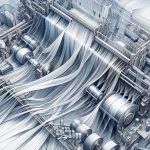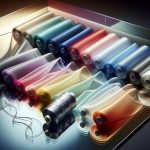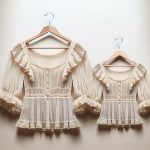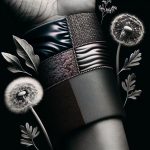Looking to elevate your sewing projects?
Did you know that the type of fabric you use can significantly impact the quality of your sewing thread? Understanding which fabrics work best for high-quality sewing thread is crucial for achieving professional results.
By considering factors such as fabric weight, fiber content, weave, stretch, and specialty thread compatibility, you can master the art of choosing the right fabric for your sewing projects.
In this guide, we'll explore the best fabrics for specific projects and provide insights into fabric preparation techniques, ensuring that you achieve impeccable results in your sewing endeavors.
Key Takeaways
- Lighter fabrics like silk and chiffon require finer threads.
- Heavier fabrics like denim and canvas need thicker, stronger threads.
- Natural fibers like cotton or silk are preferred for their softness and breathability.
- Synthetic fibers like polyester or nylon offer increased strength and durability.
Considerations for Fabric Weight
When choosing sewing thread, consider the fabric weight by selecting a thread that matches the weight of the fabric you're using. The fabric weight refers to the thickness and density of the fabric. Lighter fabrics like silk and chiffon require finer threads, while heavier fabrics like denim and canvas need thicker, stronger threads. Matching the thread to the fabric weight is crucial for achieving balanced fabric tension and ensuring the durability of the seams.
Incorrect thread selection can lead to fabric tension issues during sewing. If the thread is too thick for a lightweight fabric, it can cause puckering or gathering along the seams. On the other hand, using a fine thread on heavy fabric may result in weak seams that are prone to breakage. Understanding the relationship between fabric weight and thread selection is essential for mastering various sewing techniques.
Choosing the Right Fiber Content
When choosing the right fiber content for high quality sewing thread, there are several factors to consider.
First, you need to consider the differences between natural and synthetic fibers. Natural fibers, such as cotton or silk, are often preferred for their softness and breathability. On the other hand, synthetic fibers, like polyester or nylon, offer increased strength and durability.
Next, consider the weight of the thread in relation to the fabric you will be sewing. A heavier thread may be suitable for thicker fabrics, while a lighter thread may work better for delicate fabrics.
It's also important to think about the intended use of the finished product. If you are sewing something that will undergo a lot of wear and tear, like a bag or a piece of outdoor gear, you will want to choose a thread with a high level of durability.
Finally, consider the stitch quality that the fiber content can provide for your sewing project. Some fibers may create smoother, more even stitches, while others may be more prone to fraying or breaking.
Natural Vs. Synthetic Fibers
You should consider balancing the attributes of natural and synthetic fibers when choosing the right fiber content for high quality sewing thread.
Natural fibers, like cotton and silk, are known for their sustainability and biodegradability, making them eco-friendly choices.
On the other hand, synthetic fibers, such as polyester and nylon, are valued for their performance characteristics, including strength, durability, and resistance to moisture and chemicals.
When deciding between natural and synthetic fibers for sewing thread, it's important to weigh the environmental impact and sustainability of natural fibers against the performance benefits of synthetic fibers.
Consider Thread Weight
Consider balancing the thread weight of your sewing thread by choosing the right fiber content to ensure optimal performance and durability for your high-quality projects. Thread weight plays a crucial role in achieving the desired results in your sewing projects. It affects thread tension, fabric handling, and the likelihood of thread breakage. When selecting the fiber content for your sewing thread, it's important to consider the specific requirements of your project and the sewing techniques you intend to use. Here's a table to help you understand the relationship between thread weight and fiber content:
| Thread Weight | Fiber Content |
|---|---|
| Light | Cotton |
| Medium | Polyester |
| Heavy | Silk |
| Extra Heavy | Nylon |
| Ultra Heavy | Linen |
Carefully evaluating your choice of fiber content based on the thread weight will contribute to the success of your sewing projects.
Durability and Stitch Quality
To achieve optimal durability and stitch quality in your sewing projects, it's essential to carefully select the right fiber content based on the thread weight. Here are some key considerations when choosing the right fiber content for high-quality sewing thread:
- Durability: Look for fibers such as polyester or nylon, known for their strength and resistance to abrasion. These fibers can withstand the rigors of sewing and offer long-lasting durability.
- Colorfastness: Opt for fibers that have excellent colorfastness to ensure that the thread maintains its color and appearance even after multiple washes or exposure to sunlight.
- Stitch Tension and Thread Breakage: Choose fibers that are less prone to stretching or breaking under tension, such as cotton-wrapped polyester or mercerized cotton, to achieve consistent stitch quality and minimize thread breakage.
Understanding Fabric Weave
Now that you understand the importance of fiber content in choosing the right sewing thread, it's time to consider the fabric weave.
The weave of the fabric plays a crucial role in determining the type of thread that will work best for your project.
Understanding fabric weave will help you select the appropriate sewing thread that complements the fabric and enhances the quality of your sewing.
Importance of Weave
Understanding the fabric weave is essential for selecting the best fabrics for high quality sewing thread. The weave impact on sewing thread quality is significant and can affect the overall performance of the fabric and the thread. Here's why understanding fabric weave is crucial:
- Thread Performance: Different fabric weaves can impact the performance of the sewing thread. For instance, tightly woven fabrics may require a stronger and more durable thread to withstand the tension and stress during sewing.
- Durability and Appearance: The weave of the fabric determines its durability and appearance, which in turn affects the quality of the sewing thread. A tightly woven fabric may require a different type of thread compared to a loosely woven one to achieve the desired strength and look.
- Stitch Precision: The fabric weave influences stitch precision, and selecting the right thread for a particular weave is crucial for achieving high quality sewing results.
Choosing Thread Accordingly
First, consider the fabric weave when choosing the appropriate thread for your sewing project to ensure optimal performance and durability. The thread tension varies depending on the fabric's weave, affecting how the thread interacts with the material.
For example, a tightly woven fabric like denim requires a robust, thicker thread to withstand the fabric's density, while a delicate, loose weave necessitates a finer thread to prevent damage to the fabric.
Additionally, color matching is crucial for a seamless finish. Match the thread color to the fabric's hue to conceal stitches and create a polished look.
Understanding the fabric weave helps you choose the right thread, ensuring your sewing project is both visually appealing and structurally sound.
Impact of Fabric Stretch
When choosing sewing thread, consider how fabric stretch affects the overall quality and durability of your project. Fabric elasticity and the impact of fabric tension play a crucial role in determining the suitability of sewing thread for different materials.
Here are three important considerations regarding the impact of fabric stretch:
- Fabric Type: Different fabrics have varying levels of stretch and elasticity. For instance, knits and stretchy fabrics require threads with good elasticity to withstand the fabric's stretch without breaking. On the other hand, non-stretch fabrics like denim or canvas require threads with less elasticity to ensure proper tension and stitching.
- Thread Elasticity: The thread's ability to stretch and recover is essential when working with fabrics that have stretch. A highly elastic thread is necessary for accommodating the movement of stretch fabrics without causing breakage or loose seams.
- Seam Durability: The impact of fabric stretch directly affects the durability of the seams. Using a thread with the appropriate elasticity for the fabric prevents the seams from puckering, popping, or breaking when the fabric is stretched, ensuring the longevity of your project.
Understanding how fabric stretch influences the choice of sewing thread is fundamental to achieving high-quality and long-lasting results.
Compatibility With Specialty Threads
Consider experimenting with different specialty threads to enhance the quality and versatility of your sewing projects. Specialty thread options such as metallic, rayon, silk, and heavy-duty threads can add unique textures, sheens, and strength to your creations.
However, using specialty threads requires a keen understanding of thread tension techniques to ensure smooth sewing and prevent thread breakage. Metallic threads, for instance, are best sewn with a slightly looser tension to accommodate their delicate nature and prevent them from breaking.
Rayon and silk threads, on the other hand, may require adjustments to the tension discs and upper thread guides to prevent excessive stretching and breakage.
When working with heavy-duty threads, it's important to adjust the tension to accommodate the thicker diameter of the thread.
Environmental Considerations
To ensure environmentally friendly sewing practices, select fabrics that are sustainably sourced and biodegradable, minimizing the ecological impact of your sewing thread. When considering the environmental impact of your sewing thread, keep in mind the following eco-friendly alternatives and sustainable practices:
- Organic Cotton: Opt for sewing threads made from organic cotton, which is grown without the use of synthetic pesticides or fertilizers. This helps reduce the environmental impact of agricultural practices and promotes soil health.
- Recycled Polyester: Look for sewing threads made from recycled polyester, which reduces the need for new raw materials and minimizes waste. Using recycled polyester contributes to a circular economy and reduces the reliance on virgin resources.
- Hemp: Consider using sewing threads made from hemp, a fast-growing and low-impact crop that requires minimal water and no pesticides. Hemp fabric is biodegradable and has a smaller environmental footprint compared to many other textile fibers.
Fabric Preparation Techniques
When preparing fabrics for high-quality sewing thread, start by considering pre-washing and ironing to ensure optimal fabric condition. Fabric shrinkage can occur after the first wash, so pre-treating the fabric by washing and drying it as you'd the finished garment will help minimize this issue.
It's essential to handle the fabric carefully to prevent stretching or distorting it. When storing the fabric, make sure it's in a clean, dry, and well-ventilated area to avoid any potential damage.
Ironing the fabric before cutting and sewing won't only remove any wrinkles but also reveal any potential shrinkage. This step is crucial in ensuring that the final garment retains its shape and size after washing.
Best Fabrics for Specific Projects
For specific projects, select fabrics that complement the intended garment or item and enhance the performance of your high-quality sewing thread. When choosing fabrics for specific projects, consider the different fabric textures and colors that will coordinate with your thread to achieve the best results.
Here are some recommendations for selecting the best fabrics for specific projects:
- Cotton: Ideal for creating lightweight and breathable garments such as summer dresses, blouses, and shirts. The natural fiber of cotton pairs well with high-quality sewing thread, providing a smooth and even stitch.
- Denim: Perfect for creating sturdy and durable items like jeans, jackets, and bags. The thick and rugged texture of denim requires a strong and durable sewing thread that can withstand the fabric's weight and tension.
- Silk: Well-suited for elegant and luxurious projects such as evening gowns, lingerie, and formal wear. The delicate and smooth texture of silk fabric demands a high-quality sewing thread that will glide effortlessly through the fabric without causing any damage.
Frequently Asked Questions
How Does the Fabric's Color and Pattern Impact the Quality of Sewing Thread Used?
When choosing thread, consider how fabric color and pattern may impact thread quality. Fabric composition plays a role in thread compatibility. Ensure the thread complements the fabric's characteristics, allowing for a high-quality sewing outcome.
Can Certain Fabrics Cause More Wear and Tear on Sewing Machine Needles and Thread?
Certain fabrics can cause more wear and tear on sewing machine needles and thread. Understanding fabric compatibility is crucial for maintaining thread durability. Using the right thread for specific fabrics can prevent unnecessary strain on your sewing machine.
Are There Specific Fabrics That Are Better for Hand Sewing Versus Machine Sewing?
When hand sewing, choose fabrics like cotton or linen for their natural fibers that are easier to manipulate. For machine sewing, opt for synthetic fabrics like polyester or nylon for their thread compatibility and durability.
How Does Fabric Texture and Finish Affect the Performance of Sewing Thread?
Fabric texture and finish can significantly impact the performance of sewing thread. The smoothness or roughness of the fabric can affect the thread's ability to move through the material, ultimately influencing the quality of your sewing work.
Are There Any Fabrics That Are Not Suitable for Certain Types of Specialty Threads, Such as Metallic or Elastic Threads?
When working with metallic or elastic threads, some fabrics may not be suitable. Stretchy fabrics pair well with elastic threads, while delicate fabrics may not handle heavy-duty threads. High heat fabrics can be challenging.
- Snuggle Coconut Milk & Honey Fabric Softener Review - June 29, 2025
- Downy Pineapple and Coconut Fabric Softener: Is It Worth the Hype? - June 29, 2025
- Clorox Scentiva Coconut Fabric Refresher Spray: An Honest Review - June 29, 2025







